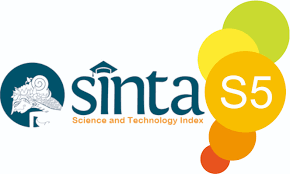Gerai Kopi di Jakarta dalam Adaptasi Kehidupan Baru
 Abstract views: 752
,
Abstract views: 752
,
 PDF downloads: 2512
PDF downloads: 2512
Abstract
Covid 19 pandemic in Jakarta forced individuals living in Jakarta to live New Normal. Restaurants, food stalls and various eating places were hit hard by this situation. This study tries to look at the impact of Covid 19 and what cafe owners are doing to be able to adapt in the New Life Adaptation Era. The method used was observation and interviews with 50 coffee cafes in various regions in Jakarta. From the results of interviews and observations there are several things that can be concluded. Coffee shops need to take new and unusual steps before the pandemic in order to survive. The steps found in this research are to build personal relationships with customers, cost savings, and focus on online marketing.
Downloads
References
Aryani, D. I. (2019). Tinjauan Sensory Branding dan Psikologi Desain Kedai Kopi Kekinian Terhadap Perilaku Konsumen (Studi Kasus: Mojo Coffee). Waca Cipta Ruang: Jurnal Ilmiah Desain Interior, 5(1), 330-336.
Bade, Robin, and Michael Parkin. Essential foundations of economics. Pearson Education, 2019.
Baker, S. R., Bloom, N., Davis, S. J., & Terry, S. J. (2020). Covid-induced economic uncertainty (No. w26983). National Bureau of Economic Research.
Bartik, A.W., Bertrand, M., Cullen, Z.B., Glaeser, E.L., Luca, M. and Stanton, C.T., 2020. How are small businesses adjusting to covid-19? early evidence from a survey (No. w26989). National Bureau of Economic Research.
Birkinshaw, J., Brannen, M.Y. and Tung, R.L., 2011. From a distance and generalizable to up close and grounded: Reclaiming a place for qualitative methods in international business research.
Bungin, M. Burhan. 2007. Penelitian Kualitatif: Komunikasi, Ekonomi, Kebijakan Publik, dan Ilmu Sosial Lainnya. Jakarta: Kencana Prenada Media Group.
Darwin, C., 2010. The works of Charles Darwin, Volume 16: The origin of species, 1876. NYU Press.
Dworkin, S.L., 2012. Sample size policy for qualitative studies using in-depth interviews.
Eriksson, P. and Kovalainen, A., 2015. Qualitative methods in business research: A practical guide to social research. Sage.
Fernandes, N., 2020. Economic effects of coronavirus outbreak (COVID-19) on the world economy. Available at SSRN 3557504.
Fromm, I. and Dubon, J.A., 2006, October. Upgrading and the value chain analysis: The case of small-scale coffee farmers in Honduras. In Conference on International Agricultural Research for Development (pp. 1-7).
Gunawan, E. J. M. (2018). Industri kopi Indonesia dan Third Wave Coffee Culture.
Hapsari, P.P., Hakim, A. and Noor, I., 2014. Pengaruh Pertumbuhan Usaha Kecil Menengah (UKM) terhadap Pertumbuhan Ekonomi Daerah (Studi di Pemerintah Kota Batu). Wacana Journal of Social and Humanity Studies, 17(2), pp.88-96.
Hidayah, I., & Susanto, A. N. (2013). Economies of scale and allocative efficiency of rice farming at West Seram Regency, Maluku Province, Indonesia. Asian economic and financial review, 3(5), 624.
Ilham, R., 2018. Improve quality of e-loyalty in online food delivery services: a case of Indonesia. Journal of Theoretical and Applied Information Technology, 96(15), pp.4760-4769.
Juliandi, A. and Manurung, S., 2014. Metodologi Penelitian Bisnis, Konsep dan Aplikasi: Sukses Menulis Skripsi & Tesis Mandiri. Umsu Press.
Kirtiş, A.K. and Karahan, F., 2011. To be or not to be in social media arena as the most cost-efficient marketing strategy after the global recession. Procedia-Social and Behavioral Sciences, 24, pp.260-268.
Lumbanraja, P., 2011. Bersama UKM membangun ekonomi rakyat dan lingkungan hidup.
Madden, J. P. (1967). Economies of size in farming. Government Printing Office: Washington.
McGrath, R.G., 2013. The end of competitive advantage: How to keep your strategy moving as fast as your business. Harvard Business Review Press.
Mhlanga, O., 2018. Factors impacting restaurant efficiency: a data envelopment analysis. Tourism Review.
Nadif, A.S., 2019. Strategi Pemasaran Online Food Delivery Grab Food Pada Wirausaha (Study Kasus Kedai Mie Bajak Pangarangan Sumenep) (Doctoral dissertation, Universitas Wiraraja).
Notta, O. and Vlachvei, A., 2015. Changes in marketing strategies during recession. Procedia Economics and Finance, 24, pp.485-490.
Octaviani, N., 2013. Pengaruh Kualitas Pelayanan Terhadap Kepuasan Pelanggan Kafe Kopi Miring Semarang. Jurnal Ekonomi Manajemen.
Perindustrian, K., 2016. Siaran Pers: Produksi Kopi Indonesia Terbesar Ketiga Dunia [internet]. Jakarta (ID):[diunduh pada 29 Maret 2017]. Tersedia pada: http://www. kemenperin. go. id/artikel/6611/Produksi-Kopi-Nusantara-Ketiga-Terbesar-Di-Dunia.
Poernomo, D., Izzah, L., Sulistiyono, S.T., Rochwulaningsih, Y., Handayani, T., Handini, Y.D., Wahjuni, S., Purwowibowo, P., Karyadi, H., Suryawati, D. and Sisbintari, I., 2019. Industri Kreatif Kafe Kopi: Analisis Pemangku Kepentingan & Prospek.
Porter, M.E., 2008. The five competitive forces that shape strategy. Harvard business review, 86(1), pp.25-40.
Reynolds, D. and Biel, D., 2007. Incorporating satisfaction measures into a restaurant productivity index. International Journal of Hospitality Management, 26(2), pp.352-361.
Sharma, A., Gregoire, M.B. and Strohbehn, C., 2009. Assessing costs of using local foods in independent restaurants. Journal of Foodservice Business Research, 12(1), pp.55-71.
Copyright (c) 2020 Edutourism Journal Of Tourism Research

This work is licensed under a Creative Commons Attribution-ShareAlike 4.0 International License.
Authors who publish with this journal agree to the following terms:
- The author (s) keeps copyright on any article.
- The author grants the journal, right of first publication with the work simultaneously licensed under a Creative Commons Attribution License that allows others to share the work with an acknowledgement of the work’s authorship and initial publication in this journal.
- Authors can enter separate, additional contractual arrangements for the non-exclusive distribution of the journal’s published version of the work (e.g., post it to an institutional repository or publish it in a book), with an acknowledgement of its initial publication in this journal.
- Authors are permitted and encouraged to post their work online (e.g., in institutional repositories or on their website) prior to and during the submission process, as it can lead to productive exchanges, as well as earlier and greater citation of published work.
- We distributed the article, and any associated published material under the Creative Commons Attribution-Share alike 4.0 International License




